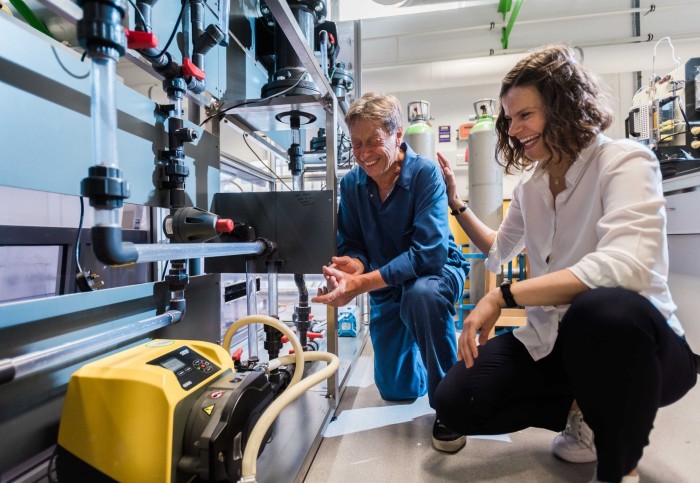Women in Innovation awards honour three founders with links to Imperial
by Ian Mundell

Dr Ola Hekselman (right) of Solveteq
They are innovative, ambitious and inspiring. And their entrepreneurial journeys all began at Imperial.
Each year, Innovate UK’s Women in Innovation programme identifies women with innovative, high-potential ideas and ambitious plans that will inspire others. And the list of 50 winners for 2022-23 features three technology entrepreneurs with links to Imperial.
This year’s winners have shown great leadership, passion and resilience in driving their innovations forward. Emily Nott Innovate UK
A record 920 applications were made to the latest round of the competition, 10% up on last year. Award winners each receive a £50,000 grant and a bespoke package of mentoring, coaching and business support.
“Each year I am blown away by the brilliant ideas and talent we uncover through our Women in Innovation programme,” said Emily Nott, Head of Equality, Diversity and Inclusion Programmes at Innovate UK. “Despite these challenging economic times, this year’s winners have shown great leadership, passion and resilience in driving their innovations forward.”
Greening battery recycling
Dr AK Ola Hekselman is the co-founder and chief executive of Solveteq, a startup working on more sustainable ways of recycling lead-acid batteries. The idea came from research that Dr Hekselman carried out together with co-founder Professor David Payne in Imperial’s Department of Materials.

She explored its business potential through the College’s Techcelerate programme for entrepreneurial postdocs, following up with a Faraday Institution Entrepreneurial Fellowship. The company was established in 2021.
“We are not attempting to redesign the entire recycling process but rather address its most economically and environmentally challenging step – removing the lead from lead-acid batteries and overcoming the informal recycling practices that result in lead pollution,” she says.
This issue is particularly urgent in low and middle-income countries, where lead pollution is a significant threat to water supplies. At the same time, Solveteq aims to provide the UK and international recycling companies with sustainable technology to substantially reduce their expenditure on energy and environmental control.
Innovation out of design
Natalie Kerres is the founder and chief executive of Scaled, a startup company developing an interlocking scale-like material that can be 3D printed to create flexible body armour, with applications in sports, medical orthotics and work safety.

She came up with the idea of borrowing protective structures from nature while studying for a Master’s degree in Global Innovation Design, offered jointly by Imperial and the Royal College of Art. She went on to pursue its commercialisation through the College’s MedTech SuperConnector programme, which supports the early-stage development of innovative medical technologies.
Originally a jeweller, she has sometimes found it hard to convince people that the arts and design can also produce technological innovation. “When I coded the initial algorithm for Scaled, it was difficult to prove and convince investors and panels that the ‘tech person’ in the company was actually me,” she says.
Water storage for all
Beren Kayali, the co-founder and chief technology officer of Deploy, is also a graduate of a joint Imperial/RCA Master’s programme, this time in Innovation Design Engineering.

She and fellow graduate Paul Mendieta set out to design flat-packed water storage units that could be assembled quickly to improve access to drinking water and sanitation in deprived areas.Along the way, they were supported by Imperial’s Venture Catalyst Challenge competition and took part in the Centre for Climate Change Innovation’s Greenhouse Accelerator, which has since evolved into Undaunted.
Now based in South Wales, Deploy has found many other uses for its system, including farming, rainwater harvesting, irrigation, and livestock feeding. Applications in disaster relief and fire mitigation are expected to follow.
Article text (excluding photos or graphics) © Imperial College London.
Photos and graphics subject to third party copyright used with permission or © Imperial College London.
Reporter
Ian Mundell
Enterprise